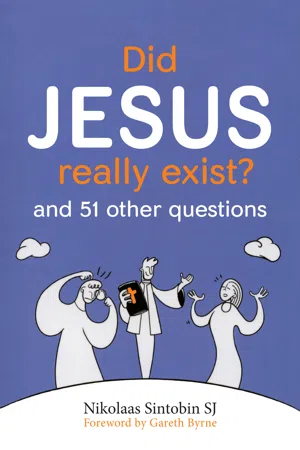![]()
QUESTION 1
Is believing exceptional?
Every human being believes, for believing is actually just as normal as eating, drinking and breathing. Think of a little child who learns to ride a bike. The child firmly believes that their father or mother will intervene immediately if something goes wrong. Think of a young man who is going to marry his girlfriend. He can never be one hundred per cent sure that she really wants to live with him all his life. He dares to take on this adventure anyway because he believes in it. He trusts her. It is certainly no coincidence that both Latin and Greek – two languages that are important in the history of the Christian faith – use the same word for trust and faith.
Complete certainty is exceptional. There are always things you do not know, and that require you to take a leap into the unknown. Often you do this with your eyes closed, more often you don’t even realise that you are jumping. Trusting in others is essential to being human. From day one in this world, life teaches you that you have to trust others to get on.
When it comes to believing in God*, things get a bit more complicated. The child who learns to cycle sees and feels that their father or mother is close. You cannot see God, and that makes the jump into the unknown a lot bigger.
Maybe you’ve heard people say, ‘I wish I could believe in God’. Believing is not something you can just decide on. It takes more than that. Believing in God – but also trusting people – is something you have to experience over and over again.
• Do you find believing easy or difficult?
• Have you noticed any change in this over the years?
See also questions 2, 6, 26, 49, 52.
![]()
QUESTION 2
Is faith for simple souls?
Faith is for all souls, simple or otherwise. People with little study or education behind them can be profoundly religious, or not religious at all. Young children can have an amazing life of faith, or not. Quite a few political leaders and successful entrepreneurs are convinced Christians while others are not. There are those who, by studying, discover their faith while others find themselves losing their faith in God* during their time as students.
Faith is not about knowing or not knowing, or about greater or lesser intelligence. Yet, Christians do not believe in just anything. That is why it is important to try to understand what faith is about. It is normal that children are taught languages, mathematics, history and many other subjects at school. Many people study such subjects for a long time. In the same way there is a lot of knowledge to be gained about the Christian faith, some of it requiring study. The study of Christian faith often results in enlightening and important insights about life.
However, many people’s knowledge of the Christian faith does not go much further than a few generalities and prejudices. Some hardly know anything about it. They know Christmas is about the baby Jesus* and Good Friday is about his death, and Pentecost*, but are confused about their meaning. Without some knowledge it is not surprising that for many everything that has to do with Christianity seems unbelievable, and at most good for simple souls. Unknown indeed often makes unloved.
• Do you think it’s important to increase your knowledge of religion?
• What or who helped you to know more about your faith?
See also questions 1, 14, 30, 42, 49.
![]()
QUESTION 3
Can you be a Christian and yet doubt your faith?
Doubt is part of the Christian faith. Believing is not the same as knowing. When your stomach rumbles, you know that you are hungry. You also know that this hunger will stop when you eat. People want certainty. What you know, you can control. People like that. It gives them a sense of security. With God*, that doesn’t work. Believing in God and in the risen Jesus* is believing in something and someone you can’t reach with your common sense. The mystery of God is reached in the mind and heart.
You can believe with your heart and soul that God exists and that Jesus lives. That doesn’t mean that doubt can’t strike. Is it all true? Don’t I confuse my dreams with reality? This can hurt. Don’t worry too much about it. Doubt comes, doubt goes.
A special example of doubt in faith can be seen in the stories of the apparitions*, at the end of the Gospels*. They describe encounters between the risen Jesus and his friends. In almost all these stories, doubt plays an important role. They can hardly believe that the man who died on a cross is alive again, and that they can see, hear and touch Jesus. Some even eat with him. If there was any doubt among those first believers, then it is normal that Christians today sometimes doubt that the whole story is true.
Doubt also has good sides. It prevents you from believing on autopilot. It can be an incentive to pay more attention to your life of faith and to keep looking for the core of it.
• Do you sometimes doubt? Which beliefs in particular?
• How do you deal with this doubt? What helps you with it?
See also questions 1, 4, 19, 46, 48.
![]()
QUESTION 4
Can a believer be critical?
Believing has nothing to do with ‘gazing at the sky and letting your mind go blank’. Faith and a critical attitude go hand in hand. Faith is about God* and therefore about life’s deepest mystery. Believers wants to entrust themselves to this mystery, even if it sometimes goes beyond their understanding. At the same time it is necessary to purify faith from superstition and therefore from unbelief. That is why Christians find it important to understand the Christian faith as much as possible with their mind, knowing that the starting point of Christianity* – the resurrection* of Jesus* – completely escapes the laws of nature and human logic. However important the critical mind may be, it does not have the last word for the believer.
The critical attitude has an important pitfall: suspicion. It is important to recognise this pitfall because it can kill trust. Without trust there is no faith. Therefore moderation is important, including with regard to the desire to understand; a desire that in itself is good. You better not wait for the moment when you understand everything with your mind, before you can believe. That is simply not possible.
Faith in God is not about sorcery or fairy tales. Just look at the harshness of the life and death of Jesus. Yet experience shows that people sometimes use faith as a shield against life, quietly hoping that God, as a wizard-figure, will solve all their problems. It is important to remember this is not how it happened in the life of Jesus. Yet, in the name of faith, strange things are still being said and done today, sometimes with the best of intentions, sometimes with less grand intentions. That is why critical thinking is so important. The critical eye can unmask the weeds in the garden of our faith.
• Do you deal critically with what you believe or do not believe?
• Have you ever weeded your garden of faith?
See also questions 2, 5, 6, 26, 48.
![]()
QUESTION 5
Can faith and science get along?
Faith and science are not mutually exclusive. They are not competitors. The reason is simple. Faith and science answer different questions. It is therefore not surprising that among great scientists you find both believers and non-believers. The inventor of the theory of the Big Bang, Georges Lemaître, was a learned professor and a Catholic* priest*.
Faith gives an answer to questions like: why do we exist? What is the meaning of life? Why is there something instead of nothing? Nuclear physics, chemistry or mathematics can’t answer those questions. That is not their domain. The question the scientist wants to answer is how our world works. For centuries people thought and believed that they could find the answer to that question in the Bible*. It has only been a few centuries since Christians started to disassemble these questions, an unravelling that is still going on.
Many people say that they believed as a child, but that they lost their faith when they discovered science. One of the reasons for this is that many people’s knowledge of faith has been limited to the knowledge they had of it when they were children. It is not surprising that such a belief is undermined by the confrontation with scientific thinking. For others, it is precisely the practice of science that is the starting point of a path of faith: who or what is at the origin of this incredibly beautiful cosmos?
• Do you think there is a contradiction between faith and science?
• Does science influence what you believe?
See also questions 1, 2, 4, 8, 17.
![]()
QUESTION 6
Are you born a Christian?
Being a Christian is not congenital or hereditary, but of course you get a lot from your parents. Your family has a big influence on who you are and who you become. This also applies to what you believe. Yet, the Christian faith is not just passed on from parent to child.
You don’t choose your mother tongue, you receive it. That doesn’t mean that you can’t learn other languages later on, but the language in which you grow up always retains something unique and definite. You can’t leave it behind you. For faith, it’s different. If you grow up in a Christian family, you can stop believing. The other way around is also possible: you were born in an unbelieving or non-believing environment, but one day you start believing in Jesus*.
Education and environment are important, but in the end being a Christian is the result of a personal choice. You become a Christian. Even if you have been brought up in the Christian faith, sooner or later you have to go for it yourself. Someone else cannot decide this in your place. Christian faith and freedom* go hand in hand.
The personal choice, however important, is not enough. Some would like to believe. They do everything they can to believe. Yet, they find that they don’t have the faith. At the end of the day, faith is something you receive. It is offered to you and then you can say ‘yes’ or ‘no’ to it. Christians call this mystery the grace* of faith.
• How and when did you come to your faith?
• Which people, experiences and events are or have been important in your faith story?
See also questions 1, 14, 47, 49, 50.
![]()
QUESTION 7
Can a human being meet God?
Every human being can meet God*. This happens all the time, even though most people are unaware of it. Christians believe that experiencing deep joy has to do with experiencing God’s presence. This is especially true for joy that leaves a good aftertaste following the event that caused the joy. You can experience that joy while praying* or in the church* but just as well at wo...



